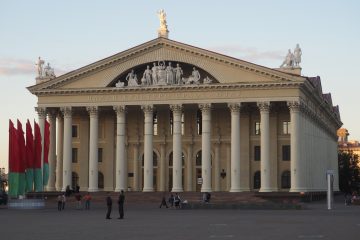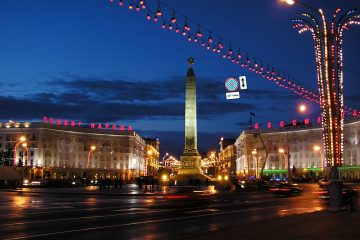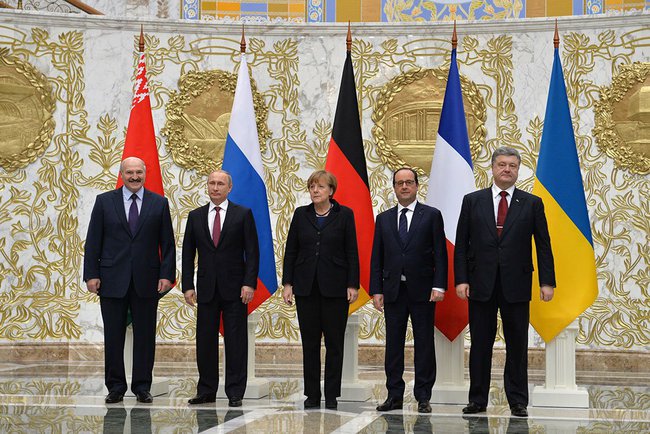Strategy Paper 2017–2018
The situation in Belarus
Belarus is feeling the political impact of Moscow’s aggressive policy towards neighbouring states with which it shares a Soviet history:
Supported by an alliance with the Russian Orthodox Church, the Kremlin is promoting a concept of statehood and nation based on the “values of Russian culture” (“Russki Mir”) and on pride in the military victory, achieved at enormous sacrifice, over Hitler’s Germany. The national consciousness finds visible and emotive expression every year in the marches of the “Immortal Regiment” on Victory Day, the 9th of May.
The shared experience of fighting the Great Patriotic War fought as part of the Soviet Union still resonates quite positively across large swathes of the Belarusian population.
Russia wields a powerful influence on and in Belarus, an influence that stems from its position as the most important economic partner in the Eurasian Economic Union and the ability to grant favourable terms for loans. However Russia is also able, even at critical moments, to exert influence by way of the fundamentally pro-Russia sentiments of large parts of the population. This political option that Moscow has is ever-present for Lukashenko, his apparatus and for the people in Belarus.
By emphasising Belarusian history and the Belarusian language – Belarusian is rarely heard in the cities or in the State administration, and sounds more awkward than not on the lips of Lukashenko though it is the native language and the commonly spoken in the flat countryside – the Belarus leadership is attempting to create a sense of national identity which, it hopes, will give rise, both objectively and in terms of subjective perception, to an awareness of a separate national identity that is anchored in their people’s political thinking and actions, as well as their minds, by creating the sense of being different from others.
Recently, there has been a lot of talk about creating an independent Belarusian university in Minsk, with Belarusian as the principle language of instruction and research. In view of the estrangement of the formerly Belarusian EHU (European Humanities University), now based in exile in Lithuania where it is still being funded by the EU, the aim in founding a new university is the formation of an awareness of the Belarusian culture and statehood. Its success depends on whether the Lukashenko regime chooses to tolerate it and the provision of sufficient funding. The choice of faculties to form at the university will be of no less significance.
At present, Belarusian is the language of instruction for 13 percent of all pupils (2012: 17 percent; 2007: 21 percent). The degree to which the current emphasis on the Belarusian language will influence these figures remains to be seen.
A further shift in the discourse on national and linguistic identity and, in connection with that, on state autonomy/ independence of the country from Russia, was a noteworthy development in 2017. The topic was increasingly taken up by the government and the President himself, in contrast to earlier years, when discussion of this issue was led by independent civil society, which is critical of the regime.
In the summer of 2017, Makei, the Belarusian foreign minister, appealed to all Belarusians to unite in view of the internal and external challenges the country is facing, at the Congress of Belarusians of the World – which brings people from the Belarusian diaspora (ca. 3.5 million in total) together every four years. On another occasion, Lukashenko himself emphasized the historical ties between Belarus and the Grand Duchy of Lithuania – a clear break with the previous national narrative, which was predicated solely on the communist past and the Great Patriotic War.
In the interest of Belarusian independence, which the policy objectives of the Kremlin leadership and the related disinformation campaigns have fundamentally called into question, the European Union invited the Belarusian president, Alexander Lukashenko, to the Eastern Partnership summit in Brussels in November 2017 for the first time – despite the absence of substantial improvement in the human rights situation in the country. Supplementing this initiative was a podium discussion held in Tallinn in October. This took the form of a dialogue among representatives of the Belarusian government and the European Union, chaired and moderated by the Civil Society Forum of the Eastern Partnership.
Joint Belarusian-Russian military manoeuvres, part of a four year cycle of exercises and referred to as “Zapad 2017”, were held, largely in Belarus, in September of 2017. In terms of personnel and weaponry, these manoeuvres were on a scale that far exceeded that which the OSCE had been notified to expect. Some incidents and demonstrations against these manoeuvres took place. Belarus had invited OSCE observers, but they were barred from access to the Russian facilities. While parts of the population feared that the Russian troops might be permanently stationed in Belarus rather than returning to their home barracks, these fears were not realized.
The negative trends with respect to the economic and social situation of the population continue. Noteworthy in this respect were the demonstrations against the separate tax on non-registered unemployed persons announced by the government. Though it tolerated the unregistered demonstrations at first, the system cracked down hard on them in the end. Through administrative sanctions (monetary fines, short terms of imprisonment) emerging flash-points were stamped out immediately, without opening the authorities to accusations of creating new political prisoners, i.e. without creating martyrs. This approach was also designed to avoid giving the Russian side an excuse to intervene, overtly or covertly, and as a visible demonstration of the regime’s ability to take action in the area of security.
In October 2017, under the influence of the demonstrations, Lukashenko recognised per decree several economic activities engaged in by individual persons that had had an informal status until then – one year after the first 18 freelance activities, e.g. shoe or watch repair, tailoring, hairdressing, had been exempted from the obligation to register as a self-employed sole trader. The sole traders must pay in advance a monthly tax set by the local authorities on the basis of orders received in the prior year. They do not have to document their accounting or submit an annual tax declaration. Products manufactured by sole traders can now be marketed over the Internet in addition to other channels. Official Belarusian statistics assume that the informal sector accounts for 20 percent of the market. Against its own will, the regime has incorporated part of the informal sector into the regulatory framework.
The population attempts to eke out a living through autonomous economic activity and by taking up work abroad.
Belarus’ IT sector, which is largely independent of the State, operates primarily for the European market and for North America, as is also the case in the Ukraine and the Baltic republics. Growth rates in the sector are impressive. Without recourse to political resistance or societal networking, the population is creating scope for economic freedom and to some extent social freedom – though this is restricted by the arbitrary denial of applications to register public associations.
The independent cultural scene is vibrant and gives the impression of autonomy.
2. Belarus and the Eastern Partnership – bilateral relations with Belarus
Belarus – An integral part of Europe
The association “Menschenrechte in Belarus e.V.” calls on the European institutions and the Governments of EU member states and also on companies and non-governmental organisations to intensify their engagement in Belarus and to reinforce the conviction of country’s population that this East European country, too, is part of Europe and will receive support from and by Europe, both in its struggle for its independence and in its internal renewal.
The Lukashenko regime’s attitude towards the European approaches of reform is one of rejection, as is that of its powerful neighbour to the east, the Russian Federation, which seeks to use the Eurasian Union to consolidate and advance Russia’s key role in Eastern Europe and other parts of the former Soviet Union.
In shaping their relations, the European Union and its members states are guided by the joint policy adopted at the Eastern Partnership summits, and which is currently directed towards developing differentiated country-specific programmes. A common forum has emerged in that of the “civil societies”, which promote the exchange of ideas and perspectives for activating civil society initiatives, independently of the state institutions.
The European Commission has also extended the support for small and medium-sized private-sector enterprises (SME sector) in Belarus provided by the European Bank for Reconstruction and Development (EBRD) by another four years, until 2021. The EBRD has been involved in Belarus within the framework of the Eastern Partnership since 2012, primarily through the provision of advising services of independent local and international experts. Between 2012 and 2016 more than 250 businesses received assistance aimed at increasing productivity, including through the provision of loans, resulting in the creation of 1500 new jobs. The EBRD’s SME programme is expected to take up another 200 businesses from Belarus’ regions by the end of 2021.
Against the backdrop of the heightening tension between Russia and Belarus, the European Union acknowledges Belarus’ efforts to secure support for the country’s independence and autonomy as a nation at the international level. Within the framework of the Eastern Partnership, the European Union decided in October 2017 to invite directly, for the first time, the country’s president to attend the summit conference of the heads of state and government of all Eastern Partnership and European Union states. No such invitation had ever been issued before due to the lack of democratic legitimacy of the Belarusian president. This constitutes a shift in the priorities in the EU’s relationship to Belarus. It should also be seen as a signal to Moscow.
Problematic areas
The so far unsuccessful negotiations on the introduction of a visa-free regime are a cloud over relations to Belarus, as vis-à-vis the Council of Europe, is Belarus’ insistence on capital punishment and its application. The European Union’s suspension of the ratification procedure for the “Partnership and Cooperation Agreement”, negotiations over which had already been concluded, in the autumn of 1996, in the wake of the formation of Lukashenko’s authoritarian regime, has impeded commerce and change in European-Belarusian relations and the possibilities of the World Bank and the European Investment Bank. The rules of the state-run economy and the absence of an independent judiciary impede foreign investment and technology transfer, indispensable preconditions for making the Belarusian economy internationally competitive. Membership in the Eurasian Economic Union cannot compensate for these disadvantages.
The existing bilateral contacts at the official level and within the framework of bilateral civil society forums – such as the Minsk Forum of the German-Belarusian Society, which now takes place at nearly regular intervals – can contribute perhaps to relaxing the tense atmosphere in the relationship but cannot be expected to do more than that.
The European Union is now also supporting non-state initiatives to benefit non-state actors, local authorities and civil society – to help promote a shift away from the closed-minded (i.e. Soviet or state-authoritarian) notions of society towards those of an open society with responsibility and of the people and citizens in the economic and social spheres. Representatives of the Belarusian state monitor all such projects.
Development potential of the universities
The European Union also continues to fund the European Humanities University (EHU), which is registered in Lithuanian exile. The EU funds are now administered by the Swedish International Development Cooperation Agency (SIDA), due to considerable misconduct in the management of the EHU that came to light in the past. However the European Union has not attempted to influence the academic structure of the university or its teaching and research goals – a disadvantage, which is resulting in the stagnation of reform or even backsliding due to a lack of innovation and initiative at this institution and others in the transition zone. One hears terms like “semblance of democracy” and there is talk of the restoration of authoritarian political and university conditions. The EHU no longer has any backing in the democratically oriented civil society of Belarus.
This problem can also be seen in the context of the attempt on the part of Belarusian side to create the possibility of acquiring academic freedom through the inclusion of Belarusian state universities on a trial basis in the Bologna process: two years later, there is no sign of a liberalization of the rigid Belarusian state system of control over their own universities.
One cannot avoid mentioning the existence of authoritarian conditions in politics and at universities in central and eastern European countries that are members of the European Union.
Berlin, December 2017
The Board
Dr. Hans-Georg Wieck
Stefanie Schiffer
Christoph Becker
Stephan Malerius


